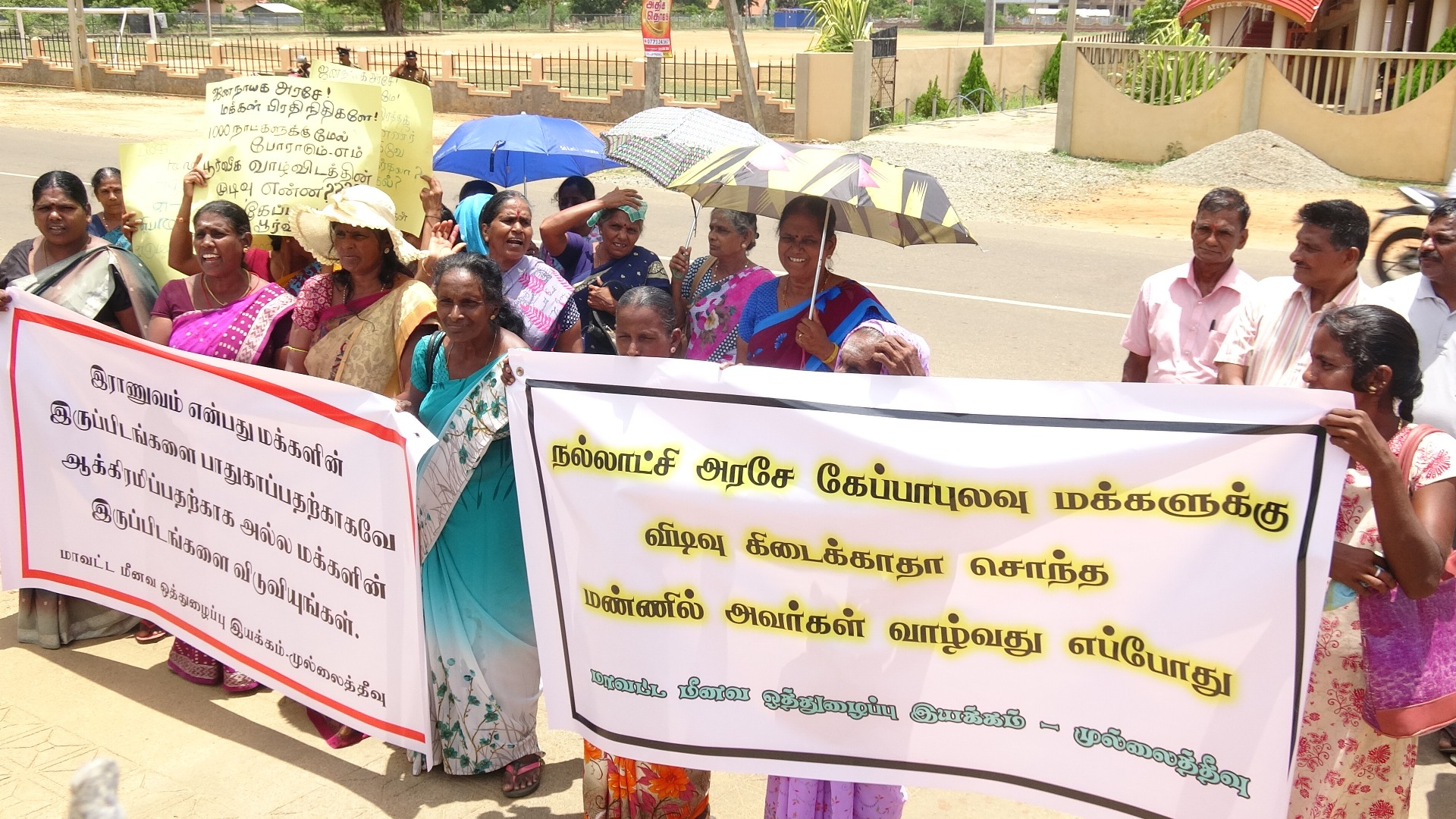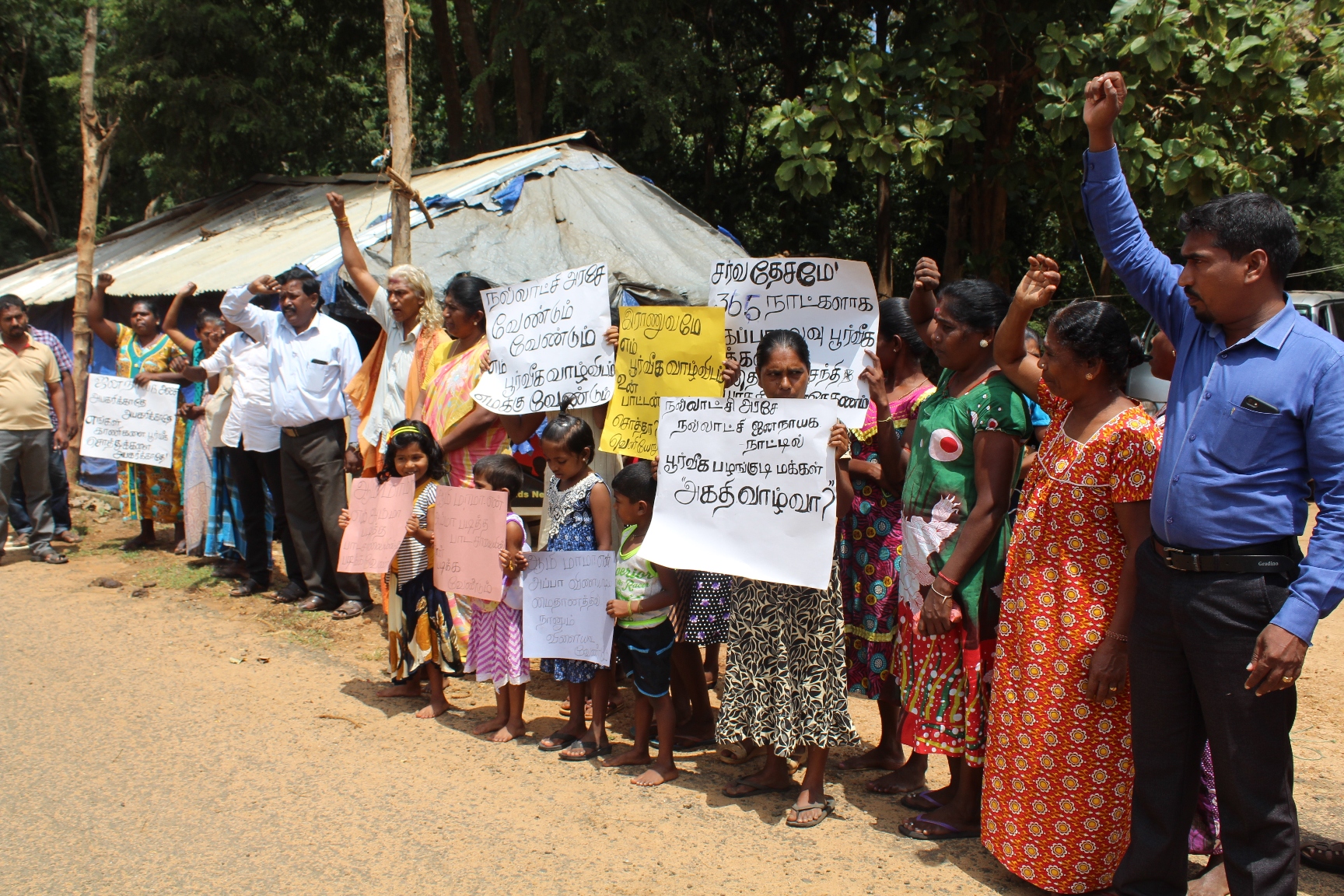Tamil women “have been protesting for the past three years, demanding army returns their land confiscated during the civil war,” Al Jazeera reports.
Chandraleela Jasinthan and her neighbours were forced out of their homes during the last days of the civil war. 10 years later and the army is still occupying their land.
“For more than three years, Jasinthan and dozens of other women in Keppapilavu have held one of the longest protests in Sri Lanka’s history at the entrance to an army camp they say was built on their ancestral land.”

Keppapilavu protesters denouncing the occupation of their land
“The men say they have to work, that they are afraid of the army. But for us women, this land is our security, our right - if we do not fight for it, who will?" said Jasinthan.
"We lost everything in the war; why must we also lose the land we have lived on for generations? These are our homes, our livelihoods," she added.
 “In Keppapilavu, some 142 hectares (350 acres) of land is still held by the army, according to the People's Alliance for Right to Land. Former President Maithripala Sirisena had promised to return all private land in the northern and eastern provinces by December 31 2018. But the deadline was not met, according to land rights groups.”
“In Keppapilavu, some 142 hectares (350 acres) of land is still held by the army, according to the People's Alliance for Right to Land. Former President Maithripala Sirisena had promised to return all private land in the northern and eastern provinces by December 31 2018. But the deadline was not met, according to land rights groups.”
Read more: 'We will not move from here until we get our land back: from inside the Pilavu protest
“Chellamma Singharatnam, a spry 87 year old who fled her home in Puthukkudiyiruppu, northeastern Sri Lanka, as the army advanced in May 2009, had to resort to a hunger strike to get her home back.”
“When she and her family returned after nearly three years in displacement camps, they learned that the army had taken over both her house and her daughter’s home. After several petitions, Singharatnam went on a hunger strike outside the district secretariat office. Other women from the village joined her, and the strike lasted a month.”
“In the end, the army agreed to return the homes, although they had been badly damaged,” she recalled.
"There was trash everywhere, the furniture was broken, even the doors and windows were gone," she said.
"We had to borrow money, and only managed to repair one house so far. We had no assistance, and don't know when we can fix the other house," she said, sitting outside her home.
“Dysfunctional legal systems, corruption, lack of transparency and accountability, and the loss of land records make it difficult to resolve land disputes during and after a war, according to researchers.”
“The army used confiscated land to set up camps and high-security zones, thwarting the return of those who fled.”
“Last year, about 100 former residents of the northern island of Iranaitivu boarded more than 24 boats from the mainland, returned to their island, and occupied it peacefully. They had been uprooted in 1992 by the army, lived on the mainland for years, only able to return to their land to fish and harvest coconuts.”

April 2018 - Iranaitivu residents sail back in daring protest
“They had hoped to return to their homes in 2009 after the war ended , but the Sri Lankan Navy said the island was of strategic importance and barred them from returning. After numerous petitions, women- particularly widows who had struggled to make a living without access to the island- staged a year-long protest from 2018, demanding the return of their land.”
Read more: Iranaitivu villagers sail back to their occupied land in daring protests

“Jasinthan has been summoned to court several times - including the day after her husband died - because of the protests. She said she has received threats, and has installed security cameras at her home and acquired a pair of guard dogs.”
"As a widow, it is harder to go against the army. But this land is all we have, so we are going to continue to protest till we get it back," she said.
Read the full piece here.
We need your support
Sri Lanka is one of the most dangerous places in the world to be a journalist. Tamil journalists are particularly at threat, with at least 41 media workers known to have been killed by the Sri Lankan state or its paramilitaries during and after the armed conflict.
Despite the risks, our team on the ground remain committed to providing detailed and accurate reporting of developments in the Tamil homeland, across the island and around the world, as well as providing expert analysis and insight from the Tamil point of view
We need your support in keeping our journalism going. Support our work today.
For more ways to donate visit https://donate.tamilguardian.com.

